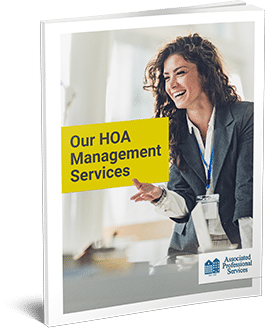As the number of homeowners associations (HOAs) continues to rise, so does the complexity of managing these communities....
How Much Money Should an HOA Keep in Its Reserve Fund?

A reserve HOA account is a savings fund that’s set aside by the association to meet future costs of upkeep and any unexpected costs that arise around the community. For these accounts, it’s important for boards to make sure they are adding or subtracting money from them periodically, or they risk the funds being escheated to the state if there has been inactivity for a period of time. In California, Boards are required to have two signers on the reserve account and any transfers over $10,000 also require two board members to authorize.
It’s also a good idea to keep a set amount of money in the reserve account at all times to cover the cost of unexpected repairs, emergencies, and replacements. Costs that are usually covered by reserve accounts include:
- Roof replacement on common area buildings
- New pump at the community pool
- New playground equipment at association’s tot lot
- Painting of common area buildings, such as the community clubhouse
- Major landscaping projects
- Construction and major renovations
- Repairing streets or driveways
Include infographics to illustrate points like the allocation of funds
How much money should be kept in an HOA reserve fund?
community, it’s usually a good idea to put between 25% and 40% of fees toward the reserve fund. Most HOAs are able to maintain a 70% funded reserve – and while not at full capacity, this amount allows the HOA to fulfill its duties and responsibilities without compromising any needed expenses within the community. A 70% funded reserve is generally seen as ideal, as it allows HOAs to weather unexpected expenses without imposing significant financial burdens on homeowners or resorting to special assessments.
An HOA reserve fund is crucial for the community’s financial health, serving as a dedicated resource for major repairs and unexpected expenses. It provides a financial safety net, mitigating the risk of deferred maintenance and ensuring prompt responses to emergencies without resorting to special assessments. Beyond preserving property values and maintaining amenities, a well-funded reserve enables stable long-term financial planning, instills homeowner confidence, and showcases the association’s commitment to responsible management. In essence, the reserve fund is a proactive tool that contributes to the overall stability and satisfaction of the community.
It’s important for every HOA to conduct a reserve study regularly so that the board has a better grasp of how much money should be allocated to the reserve fund. Reserve studies should be conducted every three years, as well as an annual inspection of the community’s amenities and an overall budget review.
Best Practices and Tips:
- Regular Assessments and Studies: Conduct regular reserve studies every 3-5 years to assess current and future capital needs. Implement stable funding strategies, such as setting aside a fixed percentage of assessments, to maintain a realistic funding plan that balances current and future requirements.
- Prioritized Funding: Identify and prioritize critical components for replacement or maintenance to ensure reserve funds are allocated efficiently. Establish a contingency reserve for unforeseen emergencies, providing an extra layer of financial protection.
- Transparent Communication: Educate homeowners on the purpose and importance of the reserve fund to build understanding and support. Clearly separate reserve and operating budgets, and consider seeking professional advice for optimal reserve fund management.
- Adaptive Planning: Regularly review and adjust the reserve plan and funding levels in response to changes in property values, community size, and infrastructure condition. Efficiently manage funds by implementing cost-saving measures and exploring competitive options for projects.
- Preparedness for Special Assessments: While striving to avoid special assessments, have a clear plan in place for their implementation if necessary. Transparent communication and fair allocation methods help minimize homeowner resistance when special assessments become unavoidable.
A 100% funded reserve is ideal
HOA reserve funds are not only used as a means to pay for unexpected replacement and repair costs but they are also used to renovate or upgrade a public area for the benefit of the entire community. This includes things like exterior painting, driveway sealing, and roof replacements.
Determining the Right Amount
These larger-scale projects are significantly more expensive than the usual daily operating costs of the community. Having a reserve fund allows the board to fund these expenses without having to raise association dues or resorting to special assessments. And with sufficient cash in the HOA reserve funds, the community will be able to account for unexpected expenses.
In these cases, it’s always better to be safe than sorry. When it comes to reserve funds, board members will be able to easily resolve any issues concerning the HOA. They can carry out necessary changes in a timely manner without burdening the homeowners with additional costs.
Legal Requirements
In general, an HOA’s accounts should be accessible by both the board and the managing agent. Most HOAs have a treasurer who has some expertise in financial matters, and some larger associations have an entire finance committee. Someone from the board should look at bills, monthly reports, and establish limits on payments. Additionally, regardless of how many accounts there are, there should be a system of checks and balances when it comes to making financial decisions.
Poor reserve fund management in an HOA can have significant consequences for the community. Deferred maintenance due to inadequate reserves can lead to the deterioration of community assets, resulting in decreased property values and a less appealing neighborhood. The reliance on special assessments to cover unexpected expenses creates financial strain on homeowners and may lead to conflicts within the community. Financial instability, decreased homeowner satisfaction, and potential legal issues can further compound the negative impact. Additionally, an HOA with a history of poor reserve fund management may struggle to attract lenders for community-related projects, limiting opportunities for improvement. Proactive and responsible reserve fund management is essential to avoid these consequences and ensure the long-term financial health and overall well-being of the association.
If you’re looking for an experienced HOA management company to help you with your finances and accounting, APS Management can help. Take a look at our HOA management services or contact us for a consultation.




